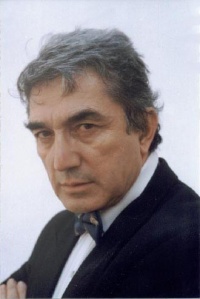Nurşat Yaqubjan-ulı

| |
| Birth: | |
| Date: | 15- Navruz, Çıçqan yıl 1948 (15th March 1948) |
| Place: | Ğulja, Uyguristan |
| Profession: | Composer, Musician |
| Relgious Affiliation: | Convert to Russian Orthodoxy from the Assyrian Church |
Biography
Nurşat Yaqubjan-ulı is the premier classical musician of Uyguristan, and is the only musical composer from Central Asia who is known on the world stage to any real degree.
Born in the city of Ğulja in the year Russian troops first entered what was to become Uyguristan, Nurşat was one of the first generation of Uygurs to receive the opportunities afforded by a Russian-led education. His father Yaqubjan Kärim-ulı and his mother Zuhra Hamal-qızı were both patriots of the Tokuz Okuz revolutionary movement, and his father Yaqubjan was an accomplished and famous Uygur folk musician in his own right. Nurşat learned music at his father’s knee, finding an affinity for the rawap.
His schooling was in one of the new Russian schools, with a Russian teacher who was a devotee of Russian classical music. Quickly seeing the musical potential in Nurşat, and the possibility of a propaganda coup for the Snorist regime, he arranged for Nurşat to be sent away to Russia to learn music at a Russian musical academy. He would stay in Russia for some time after his official schooling was complete.
Nurşat’s introduction to Russian-type classical instruments was somewhat rocky – his training on the rawap made him keep wanting to pluck the violin as well as bow it – but he persevered and became eventually even more accomplished on the violin than he had been on the rawap.
It was also during his sojourn in Russia that he began to compose. Drawing on both his family’s Uygur folk music heritage and the great tradition of Russian classical composition, his early works were somewhat clumsy attempts to synthesise the two.
Eventually, however, he found his true musical voice. His “Uyguristan Concerto” of 1978 managed to capture the feeling and tradition of Uygur folk music and reinterpret it for a classical orchestra and audience.
Returning to Uyguristan in 1980, his home country embraced their native son with enthusiasm. Nurşat’s success in Russia had, unbeknownst to him, inspired the embrace of the Western classical tradition by his people, a love which continues to this day. Nowhere else in Central Asia has classical music taken off quite so well as in Uyguristan.
Nurşat’s most famous work is the so-called “Muqam Symphony”, in which he combined the traditional Uygur intrumental mix of the Muqam with the standard Western orchestra and created a piece of unique music in which the two halves of modern Uyguristan’s musical soul combine and reinforce each other rather than competing.